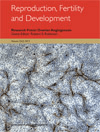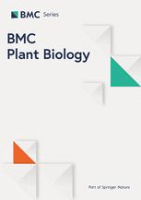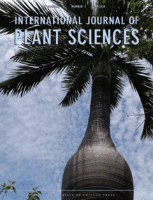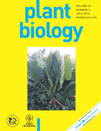
Plant Reproduction
metrics 2024
Bridging Gaps in Plant Reproductive Research
Introduction
Plant Reproduction is an esteemed academic journal published by Springer, dedicated to advancing the understanding of reproductive processes in plants. With its ISSN 2194-7953 and E-ISSN 2194-7961, this journal serves as a vital resource for researchers and professionals in the fields of cell biology and plant science. Since its inception in 2013, it has been recognized in the Q1 Quartile for plant science, underscoring its significance and impact within the academic community, while maintaining a ranking of #79/516 in the Scopus database for agricultural and biological sciences. The journal embraces an Open Access model, enhancing accessibility for a broader audience of scholars and practitioners. As we continue to converge our research efforts towards 2024 and beyond, Plant Reproduction remains committed to exploring innovative findings and fostering collaboration in plant reproductive biology, thereby contributing significantly to the global understanding of plant systems and their ecological impacts.
Metrics 2024
 0.91
0.91 2.90
2.90 3.70
3.70 68
68Metrics History
Rank 2024
Scopus
IF (Web Of Science)
JCI (Web Of Science)
Quartile History
Similar Journals

JOURNAL OF PLANT RESEARCH
Pioneering Discoveries in Plant Science.JOURNAL OF PLANT RESEARCH, published by SPRINGER JAPAN KK, is a leading academic journal that has carved a niche in the field of Plant Science. With its ISSN 0918-9440 and E-ISSN 1618-0860, this journal has been disseminating high-quality research since its inception in 1993 and continues to be essential reading for academics and practitioners alike, aiming to bridge the gap between innovative plant research and practical applications. The journal is highly regarded, holding a prestigious Q1 ranking in Plant Science for 2023, and is positioned in the top 80th percentile within the Scopus rankings for Agricultural and Biological Sciences. The journal's coverage includes a wealth of topics pertinent to advancing our understanding of plant biology, ecology, and sustainable agricultural practices. Although it operates under a subscription model, its influence in the research community remains profound, making it a vital resource for contemporary studies in plant-related disciplines.

REPRODUCTION FERTILITY AND DEVELOPMENT
Connecting researchers to the latest breakthroughs in fertility and development.Reproduction, Fertility and Development, published by CSIRO Publishing, is a prestigious journal that has been at the forefront of research in the fields of reproductive science, developmental biology, and related disciplines since its inception in 1989. With an ISSN of 1031-3613 and an E-ISSN of 1448-5990, this journal serves as a vital platform for disseminating innovative findings and methodologies that advance our understanding of reproductive processes and development in a variety of organisms. The journal is indexed in prominent databases, exhibiting a solid standing with a Q3 quartile ranking in both Animal Science and Zoology and Biotechnology, and covering 2023 rankings in multiple related categories. Operating from Australia, Reproduction, Fertility and Development embraces a commitment to enriching scholarly communication and fostering collaborative research efforts. Its focus on high-quality, peer-reviewed articles makes it an essential resource for researchers, professionals, and students seeking to stay abreast of the latest advancements and pivotal discussions in reproductive medicine and developmental biology.

BMC PLANT BIOLOGY
Unlocking the Secrets of Plant BiologyBMC Plant Biology, published by BMC, is a leading open-access journal devoted to the field of plant science, presenting high-quality research that contributes significantly to the understanding of plant biology. Since its inception in 2001, the journal has established itself as a prominent platform for disseminating innovative research, achieving a commendable Q1 ranking in Plant Science within the 2023 Scopus quartiles, and ranking #39 out of 516 journals in the Agricultural and Biological Sciences category, indicating its substantial impact with a 92nd percentile ranking. Researchers, professionals, and students engaged in the study of plant biology will find a wealth of knowledge in its comprehensive scope, covering critical areas such as molecular biology, genetics, ecology, and biotechnology. The journal's commitment to open access ensures that cutting-edge research is available to a global audience, fostering collaboration and advancement in the field. BMC Plant Biology continues to inspire and facilitate growth in plant-related studies, making it an invaluable resource for anyone interested in the vibrant and essential domain of plant science.

INTERNATIONAL JOURNAL OF PLANT SCIENCES
Exploring the frontiers of plant science and ecology.The INTERNATIONAL JOURNAL OF PLANT SCIENCES, published by UNIV CHICAGO PRESS, is a leading journal dedicated to advancing knowledge in the fields of plant sciences and ecology. With an ISSN of 1058-5893 and an E-ISSN of 1537-5315, this journal has been a prominent platform for groundbreaking research since its establishment, featuring works from 1983 to present. It holds an impressive Q2 ranking in both Ecology, Evolution, Behavior and Systematics and Plant Science, reflecting its reputable standing within the academic community. The journal is well-regarded for its rigorous peer-review process and commitment to high-quality publication standards, making it a favored choice for researchers, students, and professionals eager to engage with the latest findings and innovative methodologies in plant research. While it does not currently operate under an Open Access model, the journal provides ample access options for institutions and individuals keen to explore its curated content. By presenting diverse studies that blend theoretical and practical insights, the INTERNATIONAL JOURNAL OF PLANT SCIENCES plays a critical role in fostering interdisciplinary dialogue and advancing the frontiers of plant science research.

PROTOPLASMA
Unveiling the Secrets of Life at the Cellular LevelPROTOPLASMA is a prestigious academic journal published by Springer Wien, dedicated to advancing knowledge in the fields of Cell Biology, Plant Science, and related areas of Medicine. Established in 1926 and continuing through 2024, this journal boasts a rich history of scholarly contributions and is currently indexed with a notable ranking in various disciplines: it stands in the top quartile (Q1) in Plant Science, the second quartile (Q2) in miscellaneous Medicine, and the third quartile (Q3) in Cell Biology as of 2023. With robust Scopus rankings placing it in the 86th percentile in Plant Science and a solid position in Cell Biology, PROTOPLASMA is recognized for its commitment to high-quality research and innovative findings. Although the journal does not offer open access options, it remains a valuable resource for researchers, professionals, and students seeking to explore the cellular and molecular underpinnings of plant life and its implications in broader biological contexts. Based in Austria, PROTOPLASMA serves as a vital forum for disseminating pioneering research that shapes the future of scientific inquiry in its respective fields.

Reproduction and Fertility
Transforming research into impactful health solutions.Reproduction and Fertility is a premier academic journal published by BIOSCIENTIFICA LTD, dedicated to advancing knowledge in the fields of reproductive sciences, obstetrics, gynecology, and related areas. Established with a focus on delivering high-quality research, this journal has quickly ascended in prominence, achieving a commendable Q2 ranking in multiple categories, including Embryology, Obstetrics and Gynecology, Reproductive Medicine, and Urology, as of 2023. With an E-ISSN of 2633-8386, Reproduction and Fertility aims to provide a valuable platform for researchers, professionals, and students alike, offering insights into the latest discoveries and innovations in reproductive health. Although currently not an open-access journal, it remains committed to disseminating important findings that can influence clinical practices and policy-making worldwide. Operating from its headquarters in Bristol, United Kingdom, the journal serves as an essential resource for anyone invested in understanding and improving reproductive health outcomes through rigorous academic research.

THERIOGENOLOGY
Connecting practitioners and researchers in the realm of animal health.THERIOGENOLOGY is a prestigious academic journal published by Elsevier Science Inc, dedicated to the field of veterinary reproduction and animal science. With an impressive impact factor and recognized as a Q1 journal in various categories including Animal Science and Zoology, Equine, Food Animals, and Small Animals, THERIOGENOLOGY has established itself as a vital resource for researchers, practitioners, and students alike. Founded in 1974, the journal covers a broad spectrum of topics related to reproductive physiology, biotechnology, and the health management of food and companion animals. Although it does not currently offer open access, researchers can benefit from its comprehensive articles and reviews that push the boundaries of knowledge in veterinary science. With a significant placement in the Scopus rankings, ranking #1 in multiple veterinary categories, THERIOGENOLOGY serves as an essential platform for advancing the understanding of reproductive strategies and practices, thereby contributing directly to the fields of animal husbandry and veterinary medicine.

Reproductive Medicine and Biology
Pioneering research for a healthier tomorrow.Reproductive Medicine and Biology, an esteemed journal published by WILEY, stands at the forefront of advancements in the field of reproductive health and associated biological sciences. With an impact factor that underscores its relevance—ranking in Q1 for Reproductive Medicine and Q3 in Cell Biology—this journal is distinguished by its commitment to disseminating high-quality, peer-reviewed research since its transition to Open Access in 2002. Based in Japan, the journal caters to a global audience, providing vital insights into reproductive biology, therapeutics, and innovative practices. With Scopus rankings placing it at #22 out of 90 in Reproductive Medicine and a commendable percentile ranking, Reproductive Medicine and Biology aims to foster dialogue and knowledge transfer among researchers, professionals, and students, paving the way for breakthroughs in understanding reproductive health.

PLANT BIOLOGY
Nurturing Insights into Ecological SignificancePLANT BIOLOGY is a prestigious academic journal published by Wiley, dedicated to advancing knowledge in the fields of plant science, ecology, and evolutionary biology. With an impressive impact factor and ranking in the Q1 category for Ecology, Evolution, Behavior and Systematics, and Plant Science as of 2023, it stands at the forefront of research dissemination. The journal encompasses a broad scope of plant biology topics, providing a critical platform for researchers to share innovative findings and foster interdisciplinary collaboration. Available in both print (ISSN: 1435-8603) and online formats (E-ISSN: 1438-8677), it ensures accessibility through open access options. As a crucial resource for professionals, researchers, and students alike, PLANT BIOLOGY cultivates a deeper understanding of plant systems and their ecological significance, making it an essential addition to the library of anyone dedicated to the study of biology and the environment.

Reproductive Biology
Connecting Science to Conservation and BiotechnologyReproductive Biology is a premier academic journal published by Elsevier, dedicated to advancing the field of reproductive science. With an ISSN of 1642-431X and an E-ISSN of 2300-732X, this journal has been serving the scientific community since its inception in 2001. It notably holds a Q1 ranking in Animal Science and Zoology as of 2023, underscoring its significant impact and prominence in this domain. The journal encompasses a wide array of topics surrounding reproductive biology, including but not limited to endocrinology and developmental processes, making it an essential resource for researchers and practitioners. Although it operates under a traditional access model, its comprehensive scope offers valuable insights that contribute to advancements in reproductive health, animal conservation, and biotechnology. Published in the Netherlands, Reproductive Biology aims to foster interdisciplinary collaboration and innovation, ultimately enriching our understanding of reproductive mechanisms across various species. Researchers, professionals, and students alike will find this journal an indispensable platform for disseminating groundbreaking research and engaging with the latest findings in reproductive science.